Exploring Chhath Puja - The Festival of Faith, Devotion and Spirituality
 |
Exploring Chhath Puja
|
Travelling to Bihar (Patna) for exploring Chhath Festival:
It was the first week of November, six days after Deepawali, time for
people of Bihar to return home, a mass migration. People of Bihar, also called
Bihari, are hard workers and the economic horsepower of India. They work in different
parts of India as a bureaucrat, engineers, doctors, scientists, and workers.
They have a promise to keep; and for that, they take on the journey to their
home every year to celebrate a festival: Chhath with their family members. This is the festival of emotion and bonding among the family members. I
am also a resident of Patna, working as a marketing manager in Delhi. I also
endure this journey to my home every year. But this year, somehow it seems that
it is not possible to endure this journey. My train tickets were not confirmed,
and I was supposed to reach Patna by tomorrow evening. I was very upset and was
feeling sorry for my mother who was waiting for me. She called me, but I had no
answer to her question, “When I will be reaching Patna?” This is the question
bothering me.
But in this disdain, my best friend from Patna called me and asked about
my plan for the Chhath festival. I explained my situation. He told me that
there is an alternative option, if I don’t have motion sickness, I could book a
berth in the bus. There are a few private bus services from Delhi to Patna. I
searched for this option on the internet, and surprisingly there are more than
10 bus services from Delhi to Patna every day. I and my wife decided it is
better to check if we could get tickets on the bus rather than missing the
festival this year. Surprisingly, I got the three tickets and that in the
sleeper berth. The ticket was for next day afternoon from Anand Vihar bus
stand.
 |
Travelling to Patna on Chhath Puja' Vacation
|
Next day, my wife prepared snacks and meal for our journey. We reached
the bus stand on time. The bus left for Patna on time. Our sleeping seats were
very clean and comfortable. The travel time from Delhi to Patna is going to
take 18 hours which is a few hours longer than a train journey. But because it
is winter time and the train will be always late, this 18 hours on a bus is
better for the train journey. Most people on the bus were travelling to Patna to
celebrate Chhath festival, so it was kind of a festive mood on the bus. People
were humming Chhath songs. We also joined the chorus. Common people view this
festival of Sun. But then why do we celebrate this festival by the name- Chhath Maiya. Normally, the fact behind
this is not very well understood. There are a few legends behind this fact.
 |
Chhath Puja celebration at Patna' Ganga Ghat
|
We had a few stops for refreshments. And by the next day at 5 O’clock, we
were in Hajjipur, a town near the bank of Ganges, near Patna. There was a
traffic jam on the Gandhi Setu Bridge connecting Hajjipur to Patna. This is
probably just because of people travelling to their homes that day. After
spending a few hours in a traffic jam, we reached Patna-Mithapur bus stand. It
was a pleasant sunny day, seems that Patna was welcoming me. As soon we boarded
out of the bus, hoards of auto driver surround us, asking us to join them for a
ride. My wife was getting anxious, seeing the crowd; but suddenly I heard a familiar voice, Bhaiya Ji when you arrived? Chhath Maiya has called you and your
family. He was Sambhu, my neighbour. He runs his auto services in Patna; we always
his auto service for our ride in the city.
I looked at him and smiled and replied, “Yes the Chhath Maiya has called us. We reached home in the morning. My
mother was very glad to see us. It was the moment of emotion and love. The week of Chhath festival is very emotive
for Bihari; we meet our family
members, friends, and relatives. We all come together to celebrate the
festival: Chhath.
Myths of Chhath:
Chhath is one of the oldest
Hindu festivals, dating back to the Vedic
era. Unlike, other Hindu festivals It does not involve any idol worship. It
is dedicated to Sun and his sister, Shasthi
Devi (Goddess). People of Ganges basin mainly Uttar Pradesh and Bihar
celebrate this festival for thanking Sun and his sister for bestowing life on
the earth. The earliest recorded mentioned about this festival is in Rigveda, the hymn worshipping the God
Sun. The Vedic sage’s intake sun rays
as a source of spiritual and eternal energy. Another mentioned about this
festival is in Ramanaya (Treta Yug); Sita and Rama worshipped
after returning to Ayodhya. Sita had
kept fast and offered prayers to Sun to celebrate the coronation of Ram.
And it is also related to Mahabharata
(Dwapar Yug) where the wife of Pandava, Draupadi observe this festival to regain the lost power and
kingdom; and Sun bestowed lost kingdom back to Pandava. Also, Karna, son
of Sun and ruler of Anga-Desh (Modern
day Bhagalpur, Bihar) performed Chhath. And because of his sheer devotion to
his father Sun, he gained super-power and turned him to valiant warrior.
 |
God Sun & Chhath celebration idol at Patna
|
Another connotation of this festival is celebrated to worship manas
daughter of Brahma. Due to being born
(incarnation) from the sixth part of the nature Prakriti on this day, she is worshipped as Shasthi Maiya, She
is also called Shasthi Devi who is
incarnated to Mithlanchal, a region in Bihar as a Chhathi Maiya. This is also a reason why this festival is widely celebrated in Bihar. She
is the wife of Kartikeya (Also
known as Murugan, Skanda, Kumara, and Subrahmanya), the
Hindu God of war, due to this reason Shasthi Maiya is also
known by the name as Devsena. It is also believed
that she is the Goddess of fertility and hence due to this reason, on the sixth
day of the birth of a child in the family, Shasthi
Devi is worshipped.
According to another legend, on the day of the shasthi, Goddess resurrected the dead son of King Priyavrat. Thus, on the order of the king, people started the worshipping Shasthi Devi. And later on, this festival continued as modern-day Chhath Maiya Puja.
In another folklore, it is a celebration to worship the Sun and his two
wives’: Usha and Pratyusha. Usha means the
first ray of the day while Pratyusha means the last ray of the day. This is
also a reason in this festival, celebrant worship both setting a Sun and a
rising Sun.
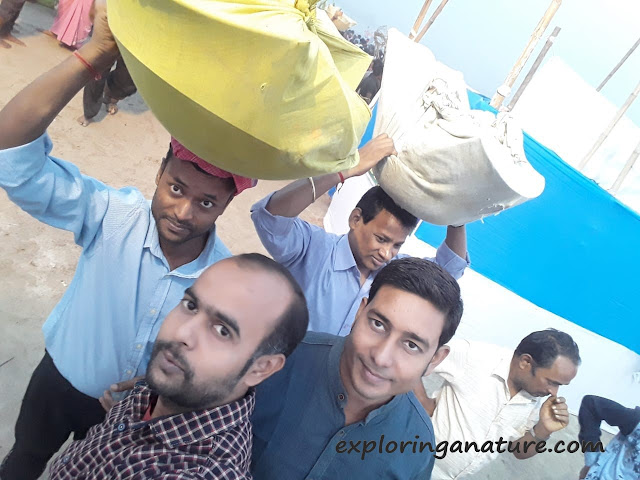 |
On the way to Ganga Ghat for worship
Though this festival is mainly celebrated in Uttar Pradesh and Bihar, it
is widely celebrated around the world. It may be related to different
civilization, where Sun is celebrated. In ancient time, Egyptian and Babylonians
performed similar rituals for Sun worship. In Greek as a goddess Eos, in Romans as a goddess Aurora, in Lithuania as a
goddess Austrine and in Arabia as a goddess Uzza was worshipped. In Vedic
tales, there is a story of Maga
people. Sun worshipper resident of Shakya
Dweep, modern-day Iran. These Maghi Brahmin also called Sakaldwipi, Shakadwipi or Magha Brahmins.
They are related to Zoroastrian, a
very first worshipper of fire. They
emigrated to India and settled down in Magadh,
modern-day Bihar. And with the colonization of India, people from Bihar. They constructed
several Sun Temples at different places in Magadh (Modern Bihar) region
including Deo, Ulaar, Aungari, Gaya,
Pandarak, etc. And with the colonization of India, people from Bihar were
taken as slaves for example to Surinam,
a Dutch colony, South Africa, Fiji, Guyana,
Trinidad, Mauritius, etc. Hence, Bihar pravashi are still celebrating this
festival in these countries until today.
|
This festival has many names Chhath Mahapuja, Chhathi Mata, Chhathi Maiya, Daala Chhath Puja and Surya Shasthi Puja
with many folklores but there is one thing common in all; we people of Bihar
celebrate this to worship one and only one God who bestowed the life and
prosperity on this planet, our God Sun.
Rituals and tradition:
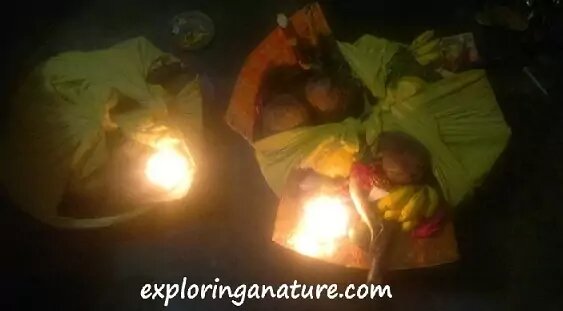 |
Daura (Daala) for evening & morning worship
|
Chhath Puja is
primarily a festival of worship of Sun God. There is believe and perception in
people that happiness, peace, safety, and prosperity come in the family from
Chhath. Chhath synonym to sixth in Sanskrit; this festival commences on the
sixth day of Hindu lunar month of Kartik.
It is celebrated for four days during which worshippers also known as parvaitin follows the rigorous rituals
including fast for two days, bath in holy water at sunrise and sunset. Also,
the family members follow strict rules; only vegetarian food in the home is
cooked without onion and garlic. This festival is observed by both male and
female alike. This festival promotes equality in society; the festival is
observed by both upper caste and lower caste, alike. No priest is involved in
this festival. Parvaitin by
themselves performed the puja. Also, if ones’ wishes are fulfilled then one
performed the puja by collecting alms.
 |
Parvaitin gives blessing after paaran at Ganga Ghat
|
Festivity rituals:
Day 1. Nahay Khay: This is the first day of Chhath, the day of body purification. Parvaitin
performed the body purification in holy water preferably in river Ganga. After
purification, they cook rice and bottle guard with split chickpeas in pure ghee
and rock salt. All foods are cooked in the river Ganga water. Parvaitin breaks ones’ fast by eating
this food.
Day 2. Kharna/Lohanda: This is the second day of the Chhath festival. On this day, the parvaitin
fast whole day and eats only after sunset. On this day, parvaitin cook prasaad.
Utmost care is taken to prepare prasad. Only organic foods are selected for
preparing prasaad, also people helping parvaitin to cook Prasaad need to be
clean. All ingredients are washed and
dried in the Sun. After Sunset parvaitin worship and offer a prasad to Chhath Maiya which is cooked by own
hand.
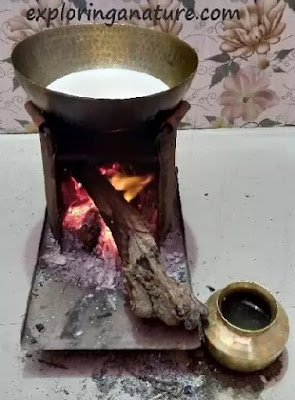 |
Pious Kheer making by Parvaitin
|
The Main prasad are: Two Rice
puddings are prepared in pure milk and ghee. One is without jaggery and another
one with jaggery. The ladoo, (also
known as Pithha) made up of rice and
roti made of pure wheat and cow ghee. Prasad is distributed among all invitee
and family members.
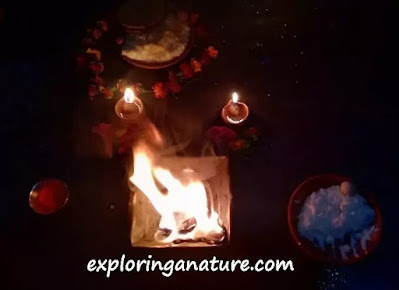 |
Evening Worship at home
|
On this day, parvaitin sets on fast for coming one and a half-day. During
this period, parvaitin avoids any
kind of fluid and solid food. They sleep on the floor and leave in isolation.
 |
Evening Prasaad at home
|
Day 3. Ardhya/Sasthi: Since morning, parvaitin and their helpers prepare special cookies
popularly called thekua, made of wheat flour, jaggery, and ghee. Also, rice laddoo (known as Kasaar)
is made of rice flour, jaggery, and ghee.
 |
Thekua making for evening Chhath worship
|
In the afternoon, these preparations along with five different fruits,
areca nut, clove, cardamom, turmeric, ginger, radish and cotton for aarti are
arranged on bamboo baskets known as Soop and Daura. This soop is specially made
by Dalit community. On this day, religiosity is on the streets.
All community comes together to make sure that streets and riverbank are
cleaned. People along with parvaitin go to the riverbank in the afternoon for
offering Ardhya to the evening sun.
 |
Thekua for prasaad offering
|
The Ardhya is a way of worshipping Sun. Parvaitin performs parikrama i.e.
circumambulation in the river after taking bath. During this parikrama, parvaitin pick soop and other devotee
offers milk and Ganges water to this soop facing Sun. In this, parvaitin thanks Sun for bestowing earth
with good harvest and providing prosperity.
 |
Evening Sun's worship at Ganga Ghat
|
Day 4. Ardhya/Paaran:
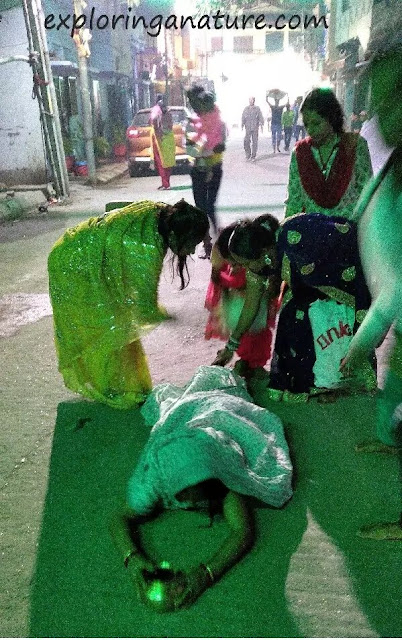 |
On the way to Ganga's Ghat for morning worship
|
This is the final day of Chhath festival. On this day devotee and
parvaitin offers Ardhya to rising
Sun.
 |
Morning Sun's view at Ganga's Ghat
|
This day, parvaitin wish for more prosperity and richness in life. Upon
final Ardhya, parvaitin break their fast. They also distribute prasad to poor
people and all people around.
 |
Worship perform after morning Ardhya
|
Festivity at home:
In my home, my mother performs Chhath every year. She is the parvaitin in
our home. I helped her in cleaning the house on the day before Nahay Khay. I
cleaned the wheat and rice, raw materials for Prasad for Nahay Khay and Ardhya. I
put them for drying on the roof. My son was in charge of keeping birds away
from these grains. In my neighbourhood, the festivity was in its prime. Devotional music was playing in the
neighbourhood. Females were singing popular Chhath songs. In the evening, I took
rice and wheat for grinding. During Chhath, even shopkeepers didn’t charge for
their services. The whole society works in a cohesive way to celebrate this
festival. I joined my mother for a voyage to the river for a purification
ritual. Taking a dip in the Ganges river washes our all sin. This year, the
riverbank in Patna city was refurbished. The new bank was created. Now it is
safer to swim in river Ganges.
In the afternoon, my sister and my wife helped my mother in cooking
prasad. In the afternoon, my mother served split chickpeas and basmati rice
to everyone. This is Prasad for Nahay
Khay day. In the afternoon, we ate prasad together. We also invited our neighbours
to join us. Next day, on the day of
kharna, my mother prepared rice pudding on wooden fire. This rice pudding is my favourite prasad. On
the day of Ardhya, we started
preparing prasad very early in the morning. We cooked thekua and rice ladoo.
 |
People celebrating Chhath Puja at Ganga Ghat
|
While we were cooking, we were chatting and sharing our stories. This
brings the joy of togetherness and love among all family members. Later in the
afternoon, I sent my friend to reserve a spot place near the bank of the river Ganges. This is required as on this day usually there is a crowd of worshippers
and it is helpful if one has a spot very close to the bank. Later, I carried
soop in the Daura to the river bank. My mother walked to the river along with
other family members to perform Ardhya. She performed the offerings to Sun at
dusk. Next day we left for river very early morning before dawn, because on
this day parvaitin, offers Ardhya to rising Sun. After Ardhya at dawn on the final day, my mother broke her fast by taking
a sip of Ganges water. She also ate thekua and banana. Later she distributed
prasad to everyone at the river bank. In the home, we prepared a feast for my
mother. We also invited our neighbour to join the feast.
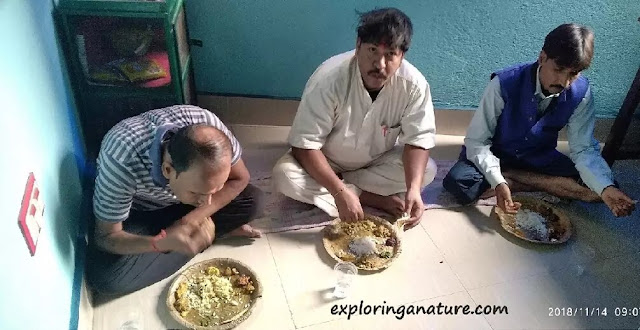 |
On last day of Chhath Puja, Prasaad offering to a devotee at home
|
With this, my holiday also ends. We have to return to Delhi. My mother
reserved an auto for dropping us at Patna railway station. Sambhoo, the auto
driver agreed to drop us to Patna railway station.
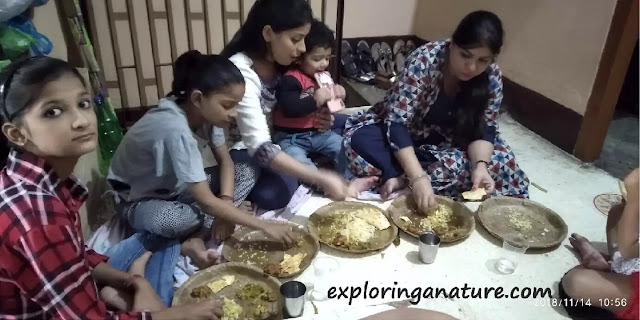 |
On last day of Chhath Puja, Prasaad offering to devotee at home
|
We bid farewell to my mother and boarded the auto. In auto, Chhath song
was playing. The journey to Patna junction took 45 minutes. At the station,
Sambhoo helped me to board the train. I still remembered his last farewell
word, “Bhaiya, Chhathi Maiya will
bring happiness in your life and she will call you again next year. You should
come next year again.” I murmured, sure I will come back again next year.




























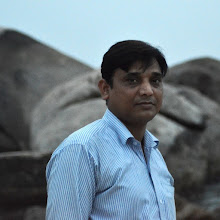







 Blogarama - Blog Directory
blogville
Blogs Directory
Blog Flux Directory
Blogarama - Blog Directory
blogville
Blogs Directory
Blog Flux Directory
No comments
If you have any doubt, please let me know.